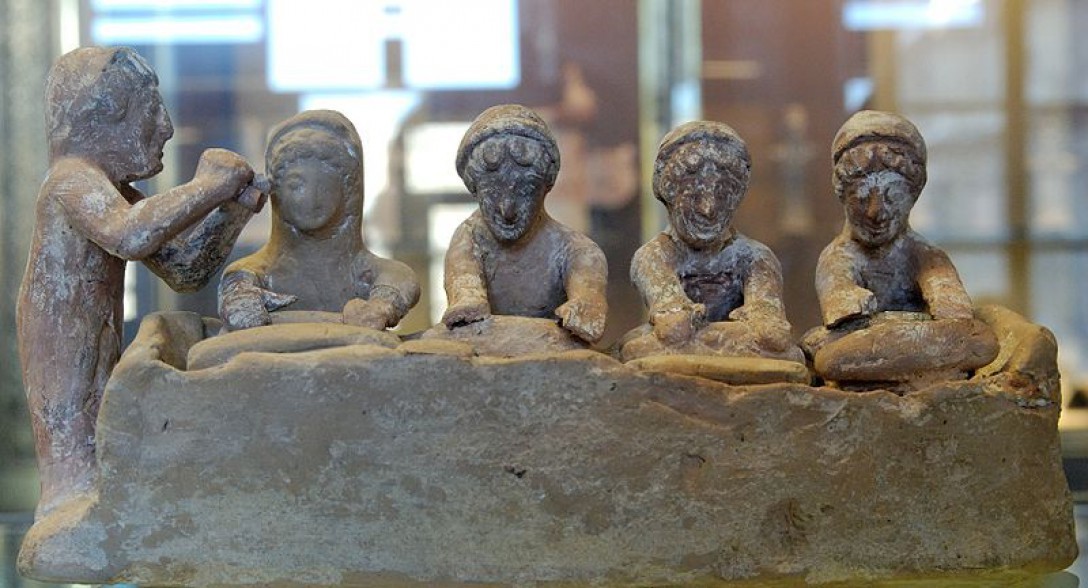A small Italian cookbook which was translated and published by an anonymus Greek doctor in 1828, with the title ‘Cooking, Translated from Italian’, appears to be the first modern printed cookbook in Greece.
In a short prologue the translator justifies his decision to offer the cookbook to the women in order to modify their cuisine in the direction of healthy Western cooking which is also tasty and not expensive. Moreover, he suggests the need for women to learn home economics in order to be proper housewives and mothers.
Due to the decline of piracy, to its geographical position, to the support of Western powers, and to other factors, Syros became known as a naval junction. Because of the high numbers of catholics it remained neutral during the revolution for the Greek Indepedence (1821). As a result, it supported financially the revolt and offered a secure shelter to the Greek refugees (mainly mariners and tradesmen) from the Ottoman Asia Minor and other places. Thus, Syros became the first urban centre of Greece. The refugees and the economic development, transformed the island into an administrative and cultural center. When the Greek State was founded, Syros became a very important commercial center of fabrics, silk, leather and iron, the most important commercial harbor in Greece and an international commercial center linking Western Europe and the Mediterranean sea to the East (1830-1860).
The book, of course, indicates the process of the urbanization and modernization of Syros which had also begun to affect the food. However, it was never reprinted until the last decade of 20th century and for a long time remained entirely ignored. Was it too early for a work like that? Obviously yes. A few years later a strong conservative wind blew defending the traditional Greek morals. A book about Western cuisine was considered as a book that promoted their corruption thus was not well received. The second Greek cookbook was printed in Constantinople in 1863 and was almost entirely French oriented, responding to the impact of the French mode on the wealthy groups.
Paste in the style of English (p. 76-78)
Cut of the crust of two or three well- baked white loaves; slice them thin into some milk, add butter and 48 gr sugar, set the pot over fire; with a spoon stir them round, till become like dough. Remove from the fire and let cool. Add 2 small, brayed candied oranges or bray a dried piece of orange peel with a little sugar and stir into the mixture; add 2 –3 egg yolks; butter a deep dish, cover the bottom with bread crumbs. Add 144 gr. corinthian raisins into the ‘dough’ and mix well. Beat the whites of the eggs very well until thickened, using a branch of basil. Stir them into the mixture, put the mixture in the dish and bake it for about 2 hours in moderate oven. Serve it hot, sprinkled with fine white sugar.
Rice paste or ricemilk in the style of English. (p. 109-110)
Wash the rice twice and pour it into a pot and cook it together with 576 gr milk, 1 cinnamon stick, 1 small candied citrus or lemon, cut into small pieces, 24 gr corinthian raisins and a pinch of salt. Cook over moderate fire stirring until mixture comes to a boil. Then leave, until the milk has evaporated. Remove from the fire, discard the cinnamon stick and add 6 egg yolks and 6 whites beaten stiff. Butter a deep dish, cover the bottom with bread crumbs and put the rice-milk in it. Put it in the oven for two hours. Turn the ricemilk upside down on a serving plate and serve while still warm.
‘Cooking, Translated from Italian. Syros 1828’. Introd. & commentary: Anna Mathaiou ( 2nd ed. 1992, edit. Etaireia Ellenikou Logotechnikou & Istorikou Archeiou)



Joumana, Cookbooks like yours are little gems!…And visit Diana’s blog http://dianabuja.wordpress.com/. You’ll find many interesting posts about Africa (colonisation, food, cooking, hunger etc.) and Egypt of course.
interesting post! I am fascinated with old cookbooks. I once found one in a flea market in Dallas, that had been published in 1927, the year my mom was born, and was specifically geared to British women who lived in Egypt, with a list of phrases to use with the indigenous staff. It was so interesting because I had been told many tales about this period of Egypt by my family.
Laurie, I’ll post a photo of the cookbook’s cover on Facebook, however I am not sure if it is a reproduction of the original cover. Btw, the title in Greek is ‘Mageiriki, Metafrastheisa ek tou italikou’. As for the basil, old recipes occasionally call for egg whites beaten with a branch of basil. And the ‘bray’…. isn’t a beautiful word?
Peter, many of the old cookbooks’ recipes need to be modernized but as social and food history, these books are priceless.
Maria,which book is this?
this is a great post – my mother left me a cookbook that she hardly ever used; i am thinking of going through it to check for more recipes that use the phrase ‘in the style of the english’
Nice find…books like this are priceless. I’m familiar with Syros’ place in our history but I’m drawn to the island and must visit it again soon.
Fascinating article, both about the cookbook and the context in which it was printed. The information about Syros’ role as an urban center at the crossroads of history was particularly interesting. I’d love to see a photo of the cookbook’s cover and/or title page. As for the recipe, beating the pudding with a branch of basil is very innovative – I’d like to try it with omelette eggs. For the definition of bray, I had to turn to the Oxford English Dictionary to find out that it means “to beat small; to bruise, pound; usu. in a mortar.” I really enjoyed this one.